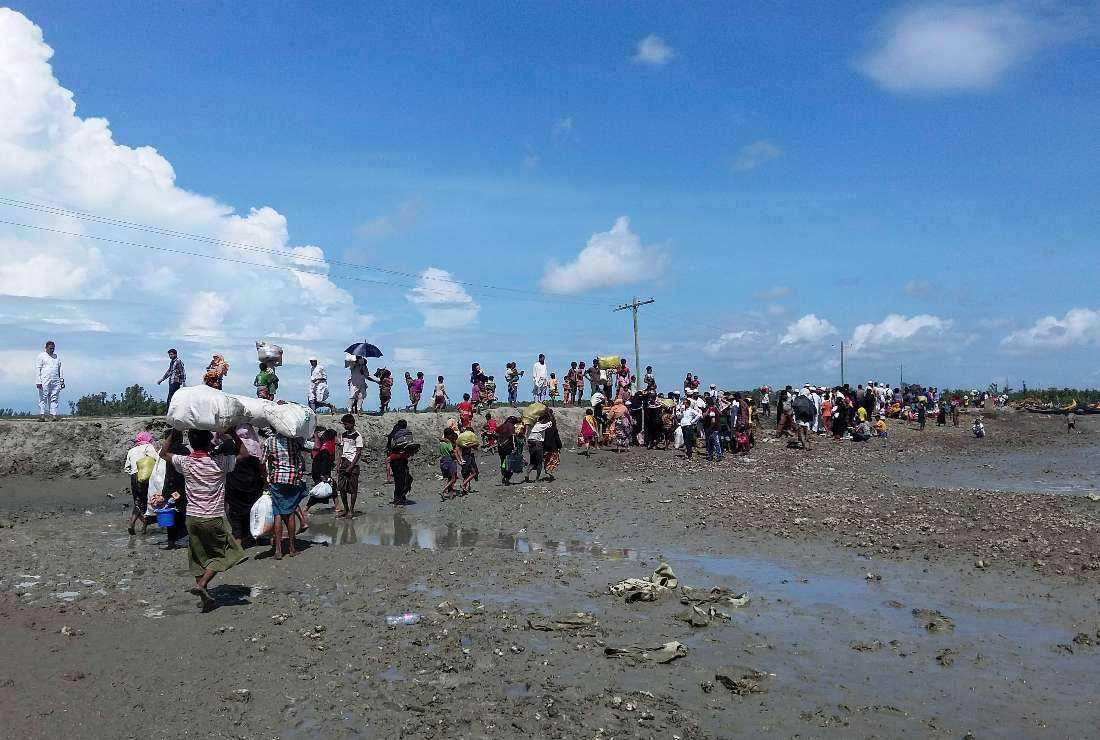
About 1.2 million ethnic minority Muslims live in Bangladesh after a majority of them fled the military crackdown in 2017

Rohingya Muslims enter Bangladesh following a military crackdown in Rakhine state of Myanmar in August 2017. (Photo: Stephan Uttom/UCA News)
Rohingya refugees have reiterated their demand for a safe and dignified return to their homeland as a Myanmar delegation visited camps in Bangladesh as part of talks over repatriation.
“We want to return to our country [Myanmar] as soon as possible and of course with dignity, with recognition as Rohingya and with civil rights,” Mohammad Kader, 55, a refugee from Balukhali camp in Cox’s Bazar, told UCA News.
Kader and his family joined tens of thousands of Rohingya Muslims who fled to Bangladesh following military crackdowns in Rakhine state in 2016 and 2017.
He is among hundreds of refugees who met with the 22-member Myanmar team that arrived on March 15. They were interviewed to verify their residency in Rakhine state.
Kader said Rohingya were asked about the location of their house, to show documents, and whether they want to go back to Myanmar or not.
Media reports say the delegation interviewed refugees to verify a list of Rohingya people prepared by Bangladesh slated for repatriation on a pilot-project basis.
A list of 800,000 Rohingya who fled to the country in 2016 and 2017 has been handed over to Myanmar, according to Bangladesh’s Refugee Relief and Repatriation Commission.
For a pilot repatriation project, some 1,140 Rohingya refugees have been cleared by Myanmar. The delegation interviewed and verified 429 Rohingya included in the list.
Bangladesh’s refugee commissioner Mizanur Rahman termed the verification step from Myanmar as very positive.
“It is a positive response when it was stopped for so long. This may advance the repatriation process but that's a higher-level decision," Rahman told UCA News.
Refugees like Kader cast doubts on whether the repatriation process will succeed after failing twice since 2018.
“Earlier we were supposed to be taken back but not a single one was taken back,” he said.
UCA News spoke to several refugees who said they want to return but they want an advance guarantee of citizenship and other basic rights in Myanmar.
Hamida Akter, 32, a Rohingya woman said she met with the Myanmar delegation and told them they will return if there is peace and they are offered rights as citizens.
“We don't want much, we want to live in peace in our own country. For this, all kinds of torture should stop and we should get citizenship. But the delegation team did not give us any such guarantee, even though we asked them so,” Akhter told UCA News.
She also fears it’s not a good time for a return as Myanmar has been in conflict since the military coup in 2021.
Bangladeshi authorities say about 1.2 million Rohingya Muslims reside in 33 camps after a majority fled the military crackdown in Myanmar in 2017.
Bangladesh and Myanmar signed a repatriation agreement the next year, but two attempts for repatriation failed as Rohingya people protested against return without concrete promises of safety and citizenship, and demanded repatriation to their homes instead of camps.
In recent times, the Bangladesh government and charity groups have been struggling to assist Rohingya amid a shortage of funding in the wake of the war in Ukraine.
Besides, a rise in crimes and violence in overcrowded camps has triggered alarms.
Bangladesh’s defense ministry reported last month, there were 222 fire accidents and 60 cases of arson in Rohingya camps in 2021-2022.
The latest fire on March 5 left 2,800 Rohingya shelters gutted and about 15,000 became homeless, local media reported.
According to police data, 115 Rohingya were killed in the camps and about 2,441 cases were filed over crimes such as murder, arms, drug, abduction, and rape since 2017.
A church official said the Rohingya issue remains unresolved as a result of Myanmar’s unwillingness and Bangladesh’s diplomatic failure.
“Since the repatriation talks started again after years, Bangladesh should increase diplomatic efforts to keep Myanmar under pressure. Just looking at world leaders for interventions won’t be enough,” a member of the Catholic bishop’s Justice and Peace Commission told UCA News on condition of anonymity.
Help us keep UCA News independent
The Church in Asia needs objective and independent journalism to speak the truth about the Church and the state.
With a network of professionally qualified journalists and editors across Asia, UCA News is just about meeting that need. But professionalism does not come cheap. We depend on you, our readers, to help maintain our independence and seek that truth.
A small donation of US$2 a month would make a big difference in our quest to achieve our goal.

Share your comments